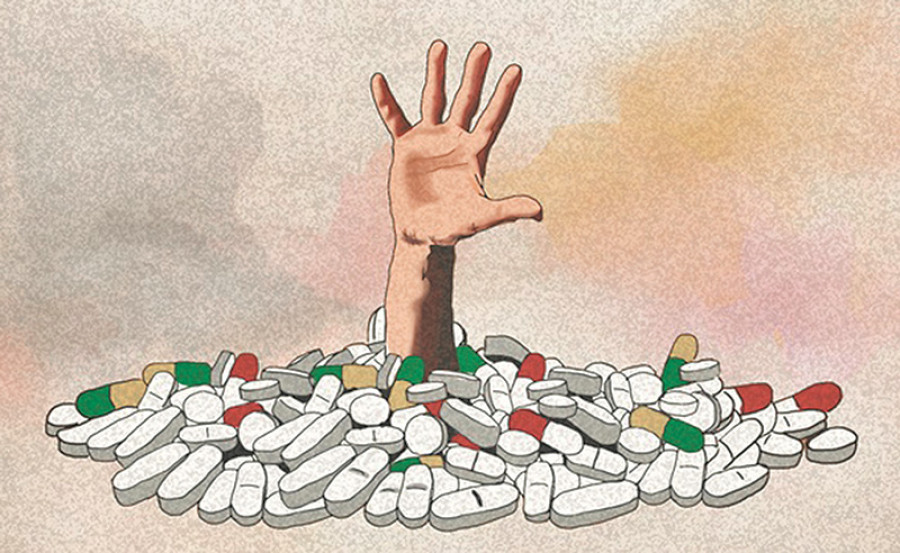Opinion
Double trouble
The number of drug abusers in Nepal has been swelling even though sound and subtle narcotic drug policies and strategies have been in place for more than a decade.
Apil R Bohara
The number of drug abusers in Nepal has been swelling even though sound and subtle narcotic drug policies and strategies have been in place for more than a decade. According to a national drug survey conducted in 2012, there were 91,534 hard drug users in the country. It has also been revealed that many drug abusers are addicted to pharmaceutical drugs. The main reason is that they are easily available on every street corner, and they can be bought without a prescription. Even pharmacists are sometimes unaware that a certain medicine can be misused as a drug. While law enforcement agencies have traditionally been focusing on controlling regular narcotics and psychotropic substances, the abuse of pharmaceutical drugs has emerged as a big issue in recent years. This is a serious matter indeed.
Various studies show that the use of pharmaceutical drugs has risen in the past few years. There is rampant use mainly along the Nepal-India border. Due to the porous frontier between the two countries, people can easily get across to buy drugs. At the same time, drug trafficking has become a source of livelihood. The Narcotics Control Bureau (NCB) of the Nepal Police is seriously concerned. The NCB, the nodal agency for narcotic drug law enforcement in Nepal, has been actively working to control drug trafficking in coordination with different stakeholders. Although a significant amount of hashish and marijuana shipments are intercepted on the Nepal-India border each year, there is much to be done on the over-the-counter drug front.
Falling into the trap
The pharmaceutical drugs that come under substance abuse are basically of three types—opioids (used as pain relievers), stimulants and depressants. There are various ways in which people abuse them, but mostly it is through overuse. Over time, the abusers become dependent on them and fall into the drug abuse trap. This has become a worldwide problem these days. According to recent figures, more than 15 million people in the US abuse prescription drugs, which is more than the combined number who reported abusing cocaine, hallucinogens, inhalants and heroin.
Prescription drug abuse accounts for the highest number of deaths from overdosing. Of the 22,400 drug overdose deaths in the US in 2005, opioid painkillers were the most commonly used, accounting for 38.2 percent of the deaths. Depressants, opioids and antidepressants were responsible for more overdose deaths (45 percent) than cocaine, heroin, methamphetamine and amphetamines combined (39 percent). In the context of Nepal, there is no clear data on deaths due to overdosing. But misuse of pharmaceutical drugs has reached a high in recent years.
Globally, an estimated 69,000 people die from opioid overdose each year, according to a 2014 World Health Organisation report. The majority of people dependent on opioids use illicitly cultivated and manufactured heroin, but an increasing proportion use prescription opioids. Due to their pharmacological effects, opioids in high doses can cause respiratory depression and death. In Nepal, there has been a drastic increment in psychotropic substances in the past few years. Codeine-based syrup, Buprenorphine, Diazepam, Nitrazepam and morphine are the common psychotropic substances trafficked and abused in Nepal.
Multilevel threats
Drug trafficking and abuse is a serious threat to national security everywhere in the world. There are social, economic and political costs of drug abuse. On a higher level, it affects national productivity, overburdens law enforcement agencies and harms the healthcare system. At the micro level, it ruins family harmony, strains public security and destroys personal productivity.
Trafficking in narcotic drugs and psychotropic substances through the internet and internet pharmacies has not been perceived till now. This trend is increasing in the developed countries, and drug traffickers are supplying their products through door-to-door service. This is something law enforcement agencies must crack down on in time. In the context of Nepal, there is no substantial evidence of such a practice, but it cannot be ruled out. No internet pharmacies are registered in Nepal, nor has any case of drug trafficking through the internet been detected by authorities. Currently, there is no national law or regulation in place that deals with drug trafficking through the internet. The Nepal Narcotics Control Act needs to be amended as soon as possible so that new trends in drug trafficking can be dealt with.
The NCB is empowered to investigate and prosecute drug offences. It also acts as a nodal unit to liaise with other international drug law enforcement agencies. The bureau maintains nine satellite stations across the country in all five development regions and at major border checkpoints, including Tribhuvan International Airport in Kathmandu. With drug traffickers using more sophisticated modus operandi, it has become urgent to enhance the capacity of the NCB and its officials. The challenges are daunting. One of the major impediments we have faced in our fight against drug trafficking is the open border between India and Nepal. Free movement across the border makes things easy for traffickers and users, but exceedingly difficult for law enforcement agencies on either side.
The cost of intelligence is very high, and the technical and human resources at our disposal are limited. Despite this and many other challenges, the NCB is seriously committed to controlling the drug menace in Nepal. The bureau has been doing its best despite limited resources and varied limitations. It has been steadfastly using its efficient and professional force to control drug abuse and trafficking. The NCB needs the support of all members of society in its fight against drugs. It is not only the duty of the NCB or any particular organisation; it is a matter of consolidation of our society, and making it free of drugs and preventing our youth from falling into addiction of any kind. Therefore, collective efforts are essential, and all stakeholders should play their part.
- Bohora is a Deputy Superintendent of Police in the Narcotics Control Bureau of the Nepal Police




 16.89°C Kathmandu
16.89°C Kathmandu










